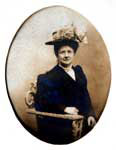
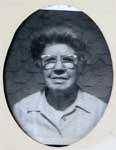
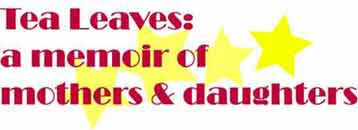
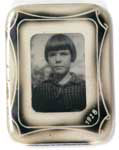
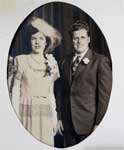
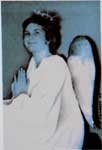
 |
 |
 |
 |
 |
 |
|
Tea Leaves: a memoir of mothers and daughters was inspired by those pictured above (left to right) my great grandmother Martha Washington Gadsby, my grandmother Ethelind Elizabeth Gadsby (later Wood and then Bell) and my mother (Sarah) Jane Mason, and my father, Albert Mason.
|
Tea Leaves: a memoir of mothers and daughters is multi-layered and has a backdrop in the U.S. labor movement. The narrator's grandmother was a spinner in a textile factory, the mother an office worker, and the narrator, the first to be graduated from college, tells their story as well as her own. Note: This is the Epilogue of Tea Leaves. To read other sections click here. Epilogue
I told my father to talk to her. I had read once that a person who is in a coma could actually hear and understand when someone speaks. I left the room as my father held her hand and spoke to her and when I came back he said she was trying to tell him that she loved him. I did see her jaw moving back and forth, so perhaps she did hear him and was trying to answer. When the nurse came, I asked her how long my mother would be in the coma. As the nurse spoke, she turned to my mother, bent down, and as she put her hands along the sides of my mother's face, she died. Her breathing, that had become slower and further apart, simply stopped. Later, I thought it was no coincidence that
my mother died at this moment. She took final control over her destiny,
ceasing to breathe when I asked how long her coma would last. She may
have felt safe in the nurse's competent hands. Perhaps she sensed the
panic of my father and I, our utter ineptness at the prospect of her dying
at home, in our hands alone. There must be a reason that my mother never mentioned this. Modesty perhaps, or humility. Then again, perhaps it wasn't either of these things. Maybe obtaining this certificate was simply she wanted to do for herself? Regardless, the artwork that she must have produced to obtain the certificate is nowhere to be found. The absences in my mother's life continued after her death. Next to her bed, she left a small spiral bound notebook with a few pages filled in. I opened this notebook, after her death, with great anticipation. It felt as if my mother had come back to talk to me. A few pages are filled in with her handwriting that grows shakier by the page. The last entry, written in pencil, is entitled "A letter to my unexpected daughter-in-law, Barbara." In the last month of her life, my mother told me that she was writing this letter. When I encouraged my mother to show it to her, she said, "I don't want it to go to her head." Every year on my birthday and on Mother's Day, Barbara thanked my mother for giving birth to me. "You always make it sound like I had her just for you," my mother would retort. In the beginning of the letter to Barbara she writes, "Many times you thanked me for giving you Janet. Now it is my turn to thank you for lending her back to me these past months of my illness." Upstairs, in the room that was my mother's bedroom before she became too weak to climb the stairs, I found another notebook. It is titled A Woman's Book, and its pages--which have a quotation from a woman writer at the top of each page--are mostly blank. But several of them are filled with her handwriting-the letters are strong and the ink dark, her usual handwriting before she became ill. On the opening page, dated 1984, roughly ten years before she died, she writes, "I am proud of my daughter…because she is herself-honest, loving, and is kind to her parents (penciled in after this, she wrote) and other poor slobs." Between her brief thoughts on anonymity,
solitude, the constraints of society, there are interesting asides such
as, "I like to embroider or crochet, but doing macramé drives
me knots." There is a quote from George Sand, written in a letter
to her mother in 1831: "Oh God! What is this frantic desire to torment
each other, which possesses human beings? This frantic desire to reprove
each other's faults bitterly, to condemn pitilessly, everyone who is not
cut upon our own pattern." My mother was the daughter of a mother
and the mother of a daughter. She knew, far better than I, that the conflict
between mothers and daughters is timeless. Earlier in this two page entry, she writes: "I hope only to be remembered as someone who was kind to those who survive me. I was not always as human and loving as I could perhaps have learned to be…Now I look back on my own life and see that I did not take care of myself as well as I should have; therefore I could have cared for others in a greater degree than I did…" She ends this piece by writing, "If one loves oneself, one loves others, as Shakespeare says: " 'This above all: to thine own self be true, and it must follow as night the day, thou canst not then be false to any [hu] man.'" Six months after my mother died, my father found a letter that she wrote to me in a notebook that my mother kept detailing my parents' financial assets. She had written the letter more than a decade prior to this-to tell me what I should do in the event that my parents would both die together. I was reading aloud, as my father requested, and at the end of the letter my mother wrote, "I, in my little dust pile, love you. You are one good worthwhile person and I'm proud of being your mother." I broke down into sobs. My father put his
hand tentatively on my shoulder. "She My mother's keen mental perception was the most important thing to her and she was lucky to have it-despite the intense physical pain she suffered-right up until she slipped into a coma in the early morning and died several hours later. I knew it was near the end, and I was hovering around her the night before, fixing her blankets, reading to her, asking if there was anything she wanted. Finally she made her last statement to me: "Janet, stop bugging me and go do your work." Then she said "Good Night," precisely and sternly, with a firm grasp on her last shred of dignity. I am grateful that I did not have to put my mother into a long-term care facility or nursing home. She wanted to die at home and my father and I were able to give her that last gift. Still, I wish she had been able to live into her eighties or nineties like I had expected her to. I see middle-aged women with elderly, barely able to walk mothers and I envy them. I wish I had known what my mother looked like as she grew older. Sometimes when I see old women who slightly resemble her I search their faces for clues. A year after my mother's death, the hardest part was still ahead of me. To simply do what was expected-to go on living without my mother-was no small feat. *** In the course of five years, there came a time when my mother's death no longer defined me. I don't remember exactly when, maybe several years after her death, perhaps sooner or later. When I saw people I had not seen in years, it was not the first thing I told them about. My grief had ceased to consume me. Writing this book enabled me to continue my conversation with my mother. At the time of my mother's death, I still had not reached the age my mother was when she had given birth to me. Those years--between thirty-five and forty--were a kind of limbo for me. The life I had constructed so carefully was intact around me, including my close circle of friends who have always helped me keep it together. Despite all this, I felt dreadfully adrift. The writing, and the contemplation of those lives that lead to mine-my grandmother's and my mother's-gave me an understanding of myself that transcended my lifetime. The writing became my anchor. When I completed this work, my conversation with my mother ended abruptly. I was tossed into a new kind of limbo. It
felt as if I had woken up one morning and didn't know whose life I was
in. The things I valued most seemed dangerously close to disintegrating.
One of the most difficult things for me was returning to the place I had
grown up. Every transgression of my youth-committed by me and against
me and, perhaps worst of all, the acts of self hatred committed against
myself-rubbed my nerve endings beyond raw as I drove down a highway that
threatened to consume me. My story has a different twist. It felt impossible for me to go back to the place I had grown up. But I had to. My father continued to live in the house he had shared with my mother. He was getting older, his eyesight diminishing. Eventually, he totaled his car and gave up his license. He needed me, and I began visiting more frequently, though I still wasn't spending as much time there as I had during my mother's illness. At first I felt split. I was there but not there, dreaming about other places, other lives that were not my own. I managed to keep the details of my life intact, but on some basic level I no longer knew who I was. After a few months this feeling passed. But still when I went back to where I came from I felt physically ill, and I was not proud of this fact. Cloudy days-the sky pressing down on me like a curtain of lead-are still the worst. "I smell the plant," I said to my father outside the diner where we had been having lunch. It was a cloudy humid day. The scent of the plant hung thickly in the air. My father declared that he didn't smell anything. "I see the plant," I said, pointing to a smokestack point up from the horizon behind a warehouse on the opposite side of the highway from us. My father looked to where I pointed, but didn't say anything.What he does point out, repeatedly, is that the nurse wrote down my mother's cause of death as cardiac arrest. Her heart did stop beating at the end as everyone's does. But it wasn't her heart that killed her; it was the cancer. The nurse was most likely following protocol in filling out the death certificate. I tell my father that there must be more cancer around than anyone admits. He says nothing. But our conversations are full of revelations. The wife of one of his closest friends from the plant has died of cancer. The man who lived next door to my parents for more than thirty years died of cancer. His wife has been in and out of the hospital. All she will say is that she is being treated for "female problems." The wife of another co-worker of my father's from the plant also died from cancer. Like my mother, this woman's cancer had spread to almost every organ of her body. This man's son, a man my age, died a year ago from cancer. This man, who I knew as a childhood acquaintance, was the first in his family to be graduated from college and afterwards he went back to the plant where he worked as a foreman. At forty years old, he died of stomach cancer. When I asked if he smoked, my father shakes his head, "no." This is the end of the conversation. The plant is no longer feeding nearly as
many families as it used to. Many of its operations have been transferred
overseas. The line of men, and the few women, punching in and out has
dwindled. The plant is fast becoming a shell, a phantom from the past. Maybe this woman was a gardener, too? Maybe not. I don't know if toxic chemicals in the air,
soil, and water seeped into my mother's bones. Any more than I know if
it was the food she ate, the electric range she cooked at for thirty plus
years, or the resentment she carried all her life toward the father who
physically abused and then abandoned her. Most likely it was a combination
of all of these factors. Still there is this wide sad gulf between
us: the absence of my mother, his wife. It is in the planning of this trip that
I begin to pick up the conversation with my mother from One day, visiting my father, I picked up
a book of poetry I have to my mother years ago. It is titled A Book
of Women Poets from Antiquity to Now and is edited by Aliki Barnstone
and Willis Barnstone. My mother read the book so often that it split down
the center. She taped the spine back together with gray electrical tape.
I opened to the table of contents and saw that my mother had checked off
her favorite poets. There are pencil check marks besides the names of
all the female Greek Lyric poets. These are the poets who have so vividly
captured my imagination: Sappho from the sixth century B.C., and the female
lyric poets who write in the centuries after her, particularly Praxilla
and Korinna. I Korinna am here to sing the courage In the same group of letters, I found a scrap of paper where my mother joined my name with Korinna. Janet-Korinna. My mother often told me that she wished she had given me two names. Perhaps this way her way of doing it, leaving a message for me to find after her death. In doing so, perhaps she was pointing me in the direction of my own destination. This is where the conversation begins again. The two of us encircled eternity.
|
|||||||||
|
|